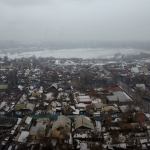My neighborhood in Detroit is rightly classified as “the hood.” To be sure, there are more dangerous areas in the world, but my block isn’t Mr. Rogers’s neighborhood.
Here, “neighboring” has become a lost art. People live in close proximity, but most are relationally distant, if not complete strangers. Constant crime, mistrust, fear, and poverty are pervasive and have shattered notions of being neighbors for many Detroiters.
While it’s easy to criticize others, years ago I realized I’d effectively removed “neighboring” from my own life. I walked the streets in a hoodie, scowling, with my hand in my pocket to look threatening and unapproachable. Subconsciously—yet inexcusably—I’d closed up my life because of trauma. The pain and loss I’d experienced just felt too suffocating.
So over time, I put up walls—hoping to protect myself from more pain. Having my brother murdered—and then losing many others to violence here in Detroit—had a devastating effect on me.
I’d allowed pain and fear to prevent me from being a good neighbor.
Hard-Won Credibility
Don’t get me wrong, I wanted to love those in our community, for this command is central to Christianity (Matt. 22:39). So once I’d repented of my lack of neighbor love, we began the journey of planting a church here in Detroit. Knowing the city’s history—and the historic lack of love those around us have experienced—we wanted to address some of the community’s most pressing felt needs.
So before we had even a single worship service, we partnered with a local school, various city organizations, and completed five service projects—all with the ambition to love and serve our neighbors in practical ways.
Why did we choose to prioritize these things? Unfortunately, the church as a whole—and black clergy in particular—often carry a stigma of fleecing the flock in my community. Our motives were constantly questioned. I had to acknowledge the past errors of others, often repeating the same phrase: “I’m so sorry that happened here, but we are different. We are here to serve, not take.”
I’ll never forget the bittersweet mix of exuberant gladness and sobering realism as we led an initiative called Project Nehemiah. With the help of partnering churches, we commercially secured 13 abandoned homes and cleared several overgrown grass lots. But there were several homes we had to avoid altogether due to fear of what we might discover.
I was moved to tears of joy as I saw people in my community embrace sweaty strangers alongside whom they served. And yet many of us shed tears of a different kind as we heard of the horrific crimes committed in these homes. The pain and brokenness in our community echoed throughout the halls in which we labored. But, difficult though this project was, it both strengthened our credibility in the community and also provided us immediate contact with numerous locals.
Church planter, do the people in your community see your church as merely a provider of religious goods and services, a spiritual organization vying for their attention in competition with other churches? Or do they recognize you as humble and loving servants of Jesus Christ?
Through the Valley
To this point in our young church, the funerals have outnumbered the weddings, and I’ve been to more arraignments and court cases than graduations. We’ve walked with many through the valley of the shadow of death, in order to display the Lord of life.
We’ve seen much gospel transformation, by God’s grace, but we’ve also walked with people through incredibly dark seasons. This has become an unexpected way we’ve loved people in our neighborhood.
To this point in our young church, the funerals have outnumbered the weddings, and I’ve been to more arraignments and court cases than graduations.
Recently we experienced a situation that had our church reeling for months. A grievous sin issue left lives damaged, our body devastated, and my leadership tested. God be praised that he permitted his light to pierce through this darkness.
By providing extensive counseling, shoulders to cry on, and tangible resources and care, we saw the Lord work restoration in this situation. And not only that, we’ve discovered that many in our community look to our church as a stabilizing force and consistent presence amid their chaos and inconsistency.
Is your church body a place of refuge for your neighbors amid the storms of life?




































